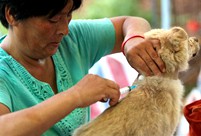

 |
| (Photo/xinhua) |
BEIJING, June 26 -- China published a report on the United States' human rights situation on Friday, hitting back at U.S. irresponsible remarks about China.
The report, titled "The Human Rights Record of the United States in 2014," was released by the Information Office of the State Council, China's Cabinet, in response to "the 2014 Country Reports on Human Rights Practices" issued by the U.S. State Department on June 25 local time.
China's report states that the U.S. made comments on the human rights situations in many countries while showing not a bit of regret for or intention to improve its own terrible human rights record.
"The U.S., a self-proclaimed human rights defender, saw no improvements in its existent human rights issues, but reported numerous new problems," it says.
While its own human rights situation was increasingly grave, the U.S. violated human rights in other countries in a more brazen manner, and was given more "red cards" in the international human rights field, according to the report.
Ji Hong, a research fellow with Institute of American Studies under the Chinese Academy of Social Sciences, said America does not hold the moral high ground to tutor or judge others in that itself is also plagued by major human rights issues.
According to Ji, who took part in drafting the report, US racial problems even deteriorated during the Obama presidency. "In the past, there were only implicit discrimination against ethnic minorities, but recent cases such as Charleston shooting spree reflected a more flagrant bias."
VIOLENCE & TORTURE
The U.S. was haunted by spreading guns, frequent occurrence of violent crimes, which threatened citizens' civil rights. The excessive use of force by police officers led to many deaths, sparking public outcry, the report says.
An unarmed 18-year-old African-American Michael Brown was shot dead by a white police officer named Darren Wilson in Ferguson, a town in Missouri. After the grand jury of both Missouri and New York decided to bring no charges against the white police officer, massive protests broke out in more than 170 cities nationwide, it cites cn.nytimes.com as saying.
"The U.S. used cruel tortures indiscriminately, notably those carried out by the Central Intelligence Agency (CIA)," it says.
To acquire intelligence from suspects of terrorism and extremism, the CIA used brutal methods, such as sleep deprivation, waterboarding, long-term solitary confinement, slamming prisoners against the wall, lashing, death threat and even "rectal rehydration" or rectal feeding, according to the report.
DISCRIMINATION & ABUSE
"The U.S. is a country with grim problems of racial discrimination, and institutional discrimination against ethnic minorities continued," according to the report.
Serious racial bias persisted in the police and justice systems. Minority groups and indigenous people are subject to unfairness in environment, election, health care, housing, education and other fields, it says.
In August 2014, the United Nations Committee on the Elimination of Racial Discrimination, in its concluding observation on the periodic report of the U.S. on the latter's implementation of relevant convention, slammed the U.S. for violating the rights of ethnic minorities, indigenous people, immigrants and other minority groups.
It criticized the fact that members of racial and ethnic minorities continued to be disproportionately arrested, incarcerated and subjected to harsher sentences, according to the report.
"American women and children's rights were not fully protected," it says, adding that women were discriminated at workplaces, and domestic violence was prevalent.
The report quotes media reports as saying that 2.1 million American women on average were assaulted by men each year. Three females were murdered by their partner each day, and four females died each day as a result of abuse.
Also, "millions of American children were homeless." Three children died each day as a result of abuse. School violence and sex assaults were pervasive and gun shootings happened from time to time, it says.
MONEY POLITICS
"Money is a deciding factor in the U.S. politics, and the U.S. citizens' political rights were not properly protected," the report says.
Despite the highest midterm election spending in history, general election voter turnout for the 2014 midterms was the lowest since World War II, according to the report.
"Dark money" flowed into elections, and the voting rights of racial minorities and other groups were intentionally suppressed, it says, adding that a few interest groups with power were able to influence the government's decision-making.
The U.S. democratic system was experiencing a crisis of representation, it says.
"Ordinary citizens feel that their supposedly democratic government no longer truly reflects their interests and is under the control of a variety of shadowy elites," the report cites Foreign Affairs as saying.
INEQUALITY
"Although the U.S. is the most developed country in the world, it is hard for the economic and social rights of its citizens to be soundly ensured," the report says.
In the process of economic recovery, the income inequality continued to be enlarged, the basic living conditions for the homeless people deteriorated, the health care system operated terribly and the education rights of average citizens were violated, according to the report.
VIOLATIONS ELSEWHERE
In the field of international human rights, the U.S. has long refused to approve some core human rights conventions of the United Nations and voted against some important UN human rights resolutions, the report says.
National Security Agency and other intelligence-gathering apparatus of the U.S. for a long time have spied on world leaders and civilians, according to the report.
Moreover, the U.S. continued to go even further to violate human rights in other countries, including infringing the privacy of citizens of other countries with the overseas monitoring project, killing large number of innocent civilians of other countries in drone strikes, and raping and killing locals by U.S. soldiers garrisoned overseas, it says.
Friday's report was the 16th such annual report published by China in response to U.S. attacks.
Li Daojun, a professor with Law School of Shandong University, said the U.S. and China should expand mutual exchange and recognition on human rights causes. "The U.S. puts political rights above all else while China seeks to focus more on ensuring people's economic opportunities and development. In essence, it's the same because the two are interdependent."
 4-year-old cute 'monk' spends summer holiday in temple
4-year-old cute 'monk' spends summer holiday in temple College graduates shining on the red carpet in Nanjing
College graduates shining on the red carpet in Nanjing PLA soldiers launch guided missiles in confrontation exercise
PLA soldiers launch guided missiles in confrontation exercise One woman’s fight against dog eaters
One woman’s fight against dog eaters Beautiful and smart - post-90s college teacher goes viral
Beautiful and smart - post-90s college teacher goes viral Top 10 luxury houses in the world
Top 10 luxury houses in the world  National Geographic: best photos during journey
National Geographic: best photos during journey Couples who engage in meaningful and deep conversations are happier
Couples who engage in meaningful and deep conversations are happier Maldives resort rated best hotel of 2015
Maldives resort rated best hotel of 2015  Global attitude poll reinforces old thinking
Global attitude poll reinforces old thinking Luxembourg scholar explodes myths about Tibet independence
Luxembourg scholar explodes myths about Tibet independence Smuggled meat came via Vietnam: official
Smuggled meat came via Vietnam: official Mentally ill confined at home due to lack of resources and public education
Mentally ill confined at home due to lack of resources and public educationDay|Week